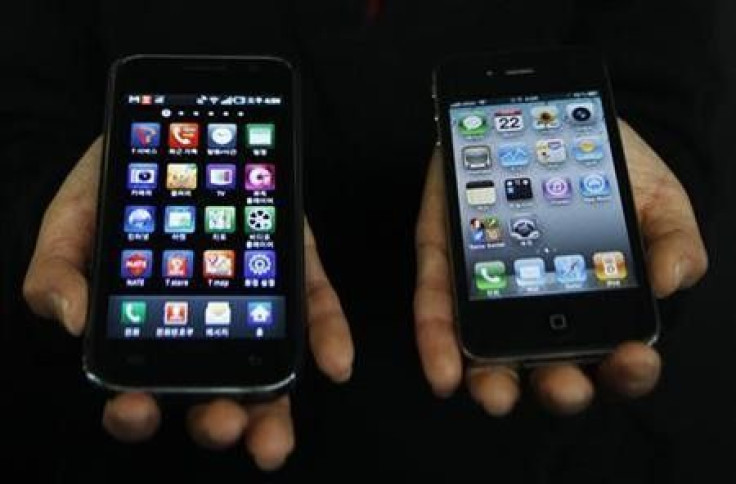Is Apple's Samsung Lawsuit Behind the iPhone 5 Release Delay?

Apple and Samsung's patent fight took a new turn as the Korean electronics maker attempted to disqualify Apple's team of outside lawyers due to conflict of interest.
Also the sudden departure of Apple's chief patent counsel Richard Chip Lutton Jr., who managed the company's IP assets for 10 years, adds a new spin to the acrimonious battle between one-time allies. Reuters reported that Lutton was leaving as he had reached the 10-year term in Apple and was leaving to pursue other avenues. However, the timing of the departure has raised questions.
Samsung is venting its ire against Apple's outside legal partners, the law firm Bridges & Mavrakakis. FOSS Patents reported that Apple's long-term supplier Samsung is seeking to bar the law firm from handling Apple's lawsuit, as five lawyers from the law firm had earlier advised Samsung in a patent lawsuit against Sony-Eriksson and Ericsson.
As the legal quagmire that Apple and Samsung are involved in continues to deepen, questions galore as to who would be the biggest loser at the end.
Samsung is one of Apple's key suppliers. In February WSJ reported that Apple placed a $7.8 billion order for components like liquid crystal displays (LCD), processors and NAND flash memory from Samsung for this year. In 2010 Apple was the second largest revenue generator for Samsung, accounting for about 4 percent of the company's total annual revenue of $142 billion.
The tremors of the patent lawsuit is affecting the supply-chain, a fact which was underscored by Samsung Electronics as it forecasts a 26 percent drop in profits during the second quarter pertaining to a decline in sales in its LCD division as Apple is one of Samsung's largest LCD buyers.
DigiTimes reported in December 2010 that Samsung will receive orders for 15 million LCD units. It was reported in February that Apple had pre-paid suppliers to corner 60 percent of the world touch panel capacity.
Samsung also manufactures the A4 and A5 microchips which are fitted in iPhone 4 and iPad 2. In January, it was reported that Samsung had signed an agreement to quadruple production of processors with the fallout being that Samsung's semiconductor division will be manufacturing more chips for Apple rather than their own line of Galaxy devices. It was also reported that Samsung was investing $3.6 billion to expand its fabrication plant in Austin, Texas.
It is surmised that Apple's next rendition of iPhone, the iPhone 5 will feature the A5 chipset which is manufactured by Samsung. With the relationship with Samsung soured, one wonders if iPhone 5 release has been delayed as Apple seeks another manufacturer.
In fact, it was recently reported that Apple will be sourcing its next-generation ARM SoC codenamed A6 from Taiwan SemiConductor Manufacturing Company (TSMC) in 2012. Apple has already severed its relationship with Samsung for future processors.
Samsung also supplies MacBook Air SSDs and NAND flash memory for Apple. It is also rumored that Apple sources DDR DRAM for mobiles from Samsung. In 2009, Apple was reported to have purchased 100 million 8GB NAND flash chips from Samsung and other suppliers.
With Tim Cook at the supply-chain helm, Apple has been following the strategy of buying components in bulk. By doing so Apple creates a scarcity in the market which shoots up the price of components. This gives Apple a price advantage over its competitors.
In light of such an arrangement the major fallout of the lawsuit with Samsung for Apple is that it has to rework its supply chain by offloading orders from Samsung to other suppliers. DigiTimes reported in December 2010 that Apple has placed an order for 35 million iPad panels from LG Display.
Early this year, Apple COO Tim Cook was quoted to have said that the company had allocated $4 billion for long-term component contracts which could be an arrangement to diversify its supply needs rather than depending on Samsung.
However, while Apple attempts to evict Samsung off its supply-chain, the immediate fallout could be the delay in iPhone 5 release. With a bulk of key components like A5 chipset, NAND flash and LCD panel being supplied by Samsung, replacing Samsung with other suppliers is cumbersome.
Samsung is also a key competitor in the smartphone race with Apple. Recently, Samsung reported that its Samsung Galaxy S 2 recorded phenomenal global sales of 3 million units in 55 days. This would demand that Samsung allocates its resources behind its star device rather than be strained by Apple's demand for components.
The strained relationship between the two could also be the reason why Apple's next tablet, the iPad 3, will not feature an AMOLED screen, as Samsung is the largest AMOLED display supplier. Thus, Apple would not like to solely depend on Samsung to meet its AMOLED demand. Industry sources revealed that even if Apple decides to fit iPad 3 with AMOLED screens, the industry lacked the capacity to meet Apple's demand.
In the light of these facts, the patent battle between Apple in Samsung could result in changing supply-chain dynamics for Apple and a major reworking of revenue source for Samsung. But until Apple tries to assemble other suppliers, iPhone 5 release can wait.
MUST READ: Apple iPhone 5: Top 10 Android 'super' smartphones that can end iPhone's rule
© Copyright IBTimes 2024. All rights reserved.











